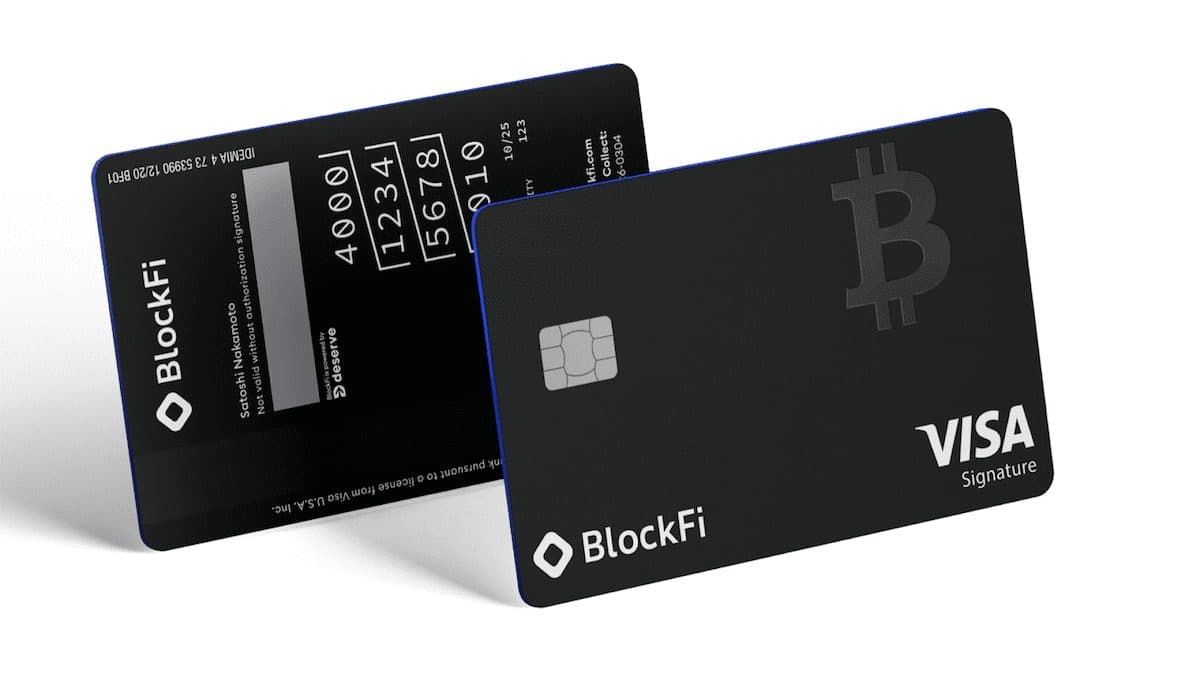BlockFi Releases Visa Rewards Credit Card to US Clients
In December 2020, the “BlockFi Rewards Visa Signature Credit Card” formed a waitlist which has grown to over 400,000 people in the past seven months.

Source: BlockFi
- Unlike regular credit card reward programs, cardholders will be able to earn 1.5% back in bitcoin on every purchase they make and a 3.5% bitcoin rewards rate for the first 90 days of opening their account.
- The bitcoin rewards are transferable on a monthly cycle to the cardholder’s BlockFI Interest Account, which can accrue daily crypto interest, which means “even more bitcoin” will be available for customers, the company said.
BlockFi, a wealth management and trading firm for cryptocurrency holders, announced it has officially launched its Visa rewards credit card for a handful of its US-based clients, providing users with cryptos returns when they use the card.
In December 2020, the “BlockFi Rewards Visa Signature Credit Card” formed a waitlist which has grown to over 400,000 people in the past seven months. The BlockFi card will begin shipping to selected and approved US residents in qualifying states, the company said.
“Following successful beta testing, BlockFi and its partners have begun offering those first in line on the credit card waitlist to apply and releasing the card to select clients,” the company said in a statement.
The waitlist is ordered on a first come first serve basis but if an applicant refers others, it helps push their position in line higher, the company said. Like a regular credit card, it can be used in any place where Visa is accepted.
“We intend on working through all eligible US residents on the waitlist as quickly as possible,” Andrew Tam, CMO of BlockFi, said in an interview with Blockworks.
Unlike regular credit card reward programs, cardholders will be able to earn 1.5% back in bitcoin on every purchase they make and an introductory offer of 3.5% bitcoin rewards rate for the first 90 days of opening their account. Cardholders can also earn 2% back in bitcoin on every dollar spent over $50,000 annually, it said.
However, the introductory offer is capped at $100 in bitcoin, which equates to about $5,000 of spending to earn an additional $100 in bitcoin and cardholders will receive 0.25% back in bitcoin on eligible trades, with a maximum of $500 in bitcoin each month, according to the fine print.
The bitcoin rewards are transferable on a monthly cycle to the cardholder’s BlockFI Interest Account, which can accrue daily crypto interest, which means “even more bitcoin” will be available for customers, the company said.
In addition to earning bitcoin, there is no annual fee and cardholders can earn bonuses on stablecoin, trading and referring friends.
As the digital currency industry grows in popularity, crypto rewards programs like this are a compelling way to engage consumers in the crypto economy, said Terry Angelos, SVP and global head of fintech at Visa.
“The crypto industry has come a long way since the first bitcoin payment transaction 11 years ago,” said Flori Marquez, co-founder and senior vice president of operations at BlockFi. “Today, nearly everyone knows about the important role crypto plays in reshaping the financial space, and our new credit card is set to be another game-changer. This card will make it easier than ever for people to earn bitcoin back while making day-to-day purchases.”
Separately, Visa’s crypto teams have focused on partnering with exchanges, wallets, and platforms to help them issue Visa cards, helping banks integrate crypto features, Blockworks previously reported. Visa also created an application programming interface, or API, in February that lets banks offer bitcoin services to their customers.






